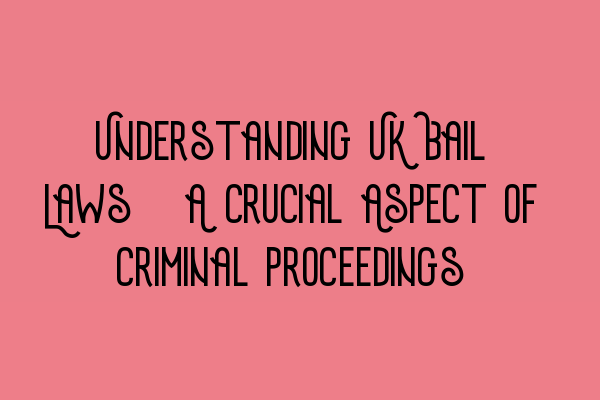Understanding UK Bail Laws: A Crucial Aspect of Criminal Proceedings
Introduction:
In the realm of criminal law in the United Kingdom, bail plays a vital role in the fair and efficient administration of justice. Bail serves as a mechanism to ensure that individuals accused of a crime can be released from custody while awaiting trial. However, the decision to grant or deny bail is not one to be taken lightly, as it balances the rights of the accused with the need to protect public safety and prevent the commission of further offences. In this article, we will delve into the intricacies of UK bail laws, exploring its significance and the factors considered by the court when deciding a bail application.
The Purpose of Bail:
Bail serves several important purposes in the criminal justice system. Primarily, it is aimed at ensuring that individuals who are not considered a flight risk or a danger to society can be released from custody pending trial. This allows defendants to retain their liberty and continue with their daily lives, provided they comply with certain conditions imposed by the court. Additionally, bail helps prevent unnecessary pre-trial detention, ensuring that individuals who are ultimately found not guilty are not subjected to unjust imprisonment.
Factors Considered by the Court:
When deciding whether to grant bail, the court considers a range of factors to determine the risk posed by the defendant. These factors include:
1. Severity of the Offence: The seriousness of the alleged offence is a critical consideration. More serious crimes may increase the likelihood of the court refusing bail, as there may be concerns regarding potential reoffending or interference with the administration of justice.
2. Criminal History: The court will assess the defendant’s past criminal record, taking into account any previous convictions or pending charges. A history of repeated offending may raise concerns about the risk of reoffending and, thus, impact the decision on bail.
3. Flight Risk: The court will consider the likelihood of the defendant absconding before trial. Factors such as ties to the community, family, or employment can influence the decision, as well as any previous attempts to evade justice.
4. Public Safety: The safety of the public is of paramount importance. The court will examine whether the defendant poses a risk to others if released. This evaluation may involve assessing the nature of the alleged offence, any alleged use of violence, or the presence of co-accused who may pose a threat.
The Bail Process:
The bail application process typically begins at the defendant’s first appearance in court. The defendant can make an application for bail, either directly or through their legal representative. The court will consider the aforementioned factors and, if appropriate, impose conditions to address any concerns. Common conditions may include reporting to a local police station, surrendering travel documents, or complying with a curfew.
It is worth noting that bail is not an automatic entitlement and can be refused. If bail is denied, the defendant may be remanded in custody until their trial. However, the defendant has the right to request a review of the decision, where new evidence or circumstances can be presented to support their release.
Conclusion:
Understanding UK bail laws is crucial for both legal professionals and defendants involved in criminal proceedings. It is a complex area that requires a careful balance between safeguarding public safety and upholding the rights of individuals accused of crimes. By considering factors such as the severity of the offence, criminal history, flight risk, and public safety concerns, the court can make an informed decision on whether to grant or deny bail.
For more information on legal topics, criminal law practice, and preparation for the Solicitors Qualifying Examination (SQE), please check out our related articles:
– SQE 1 Practice Exam Questions: Enhance your knowledge and test your understanding of SQE 1 topics with our practice exam questions.
– SQE 1 Practice Mocks FLK1 FLK2: Get ready for the SQE 1 exam with our comprehensive practice mocks, designed to simulate the real exam experience.
– SQE 2 Preparation Courses: Explore our SQE 2 preparation courses to equip yourself with the necessary skills and knowledge for success.
– SQE 1 Preparation Courses: Prepare effectively for the SQE 1 exam by enrolling in our specialized preparation courses.
– SRA SQE Exam Dates: Stay up to date with the latest SRA SQE exam dates and plan your preparation accordingly.
At SQE Criminal Law & Practice Law UK, we strive to provide comprehensive resources and guidance to support legal professionals in their journey towards success. Stay informed, stay prepared, and navigate the complex world of criminal law with confidence.
